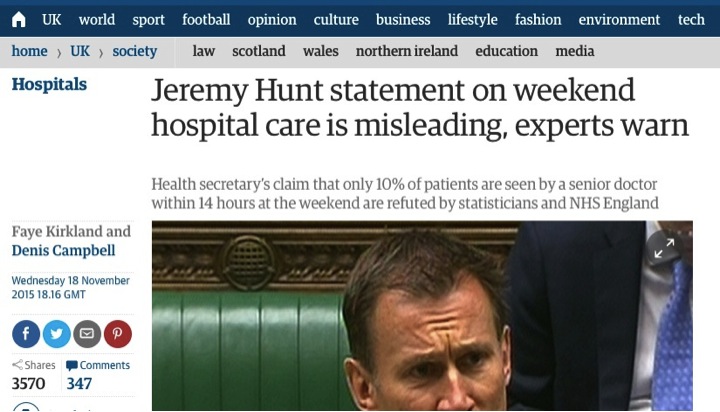Jeremy Hunt, the Guardian, and the importance of getting the stats right
As of the 23rd May 2022 this website is archived and will receive no further updates.
understandinguncertainty.org was produced by the Winton programme for the public understanding of risk based in the Statistical Laboratory in the University of Cambridge. The aim was to help improve the way that uncertainty and risk are discussed in society, and show how probability and statistics can be both useful and entertaining.
Many of the animations were produced using Flash and will no longer work.
On Thursday November 19th the printed version of the Guardian had the headline “Experts dispute Hunt's claim on weekend hospital treatment“ [online version here]. But it was not only Health Secretary Jeremy Hunt who gave a misleading statement – the Guardian also made a serious error about statistics.
The background to the story is Hunt’s comment in the Commons on October 28th, that “currently, across all key specialties, in only 10% of our hospitals are patients seen by a consultant within 14 hours of being admitted at the weekend”. This simple statement managed to achieve two errors and one misleading claim. Close examination of the data source from NHS England (table 2.1) reveals -
1. Error: The available data refers only to emergency admissions, not all admissions.
2. Error: The data refer to all seven days of the week, and so nothing specific can be said about the weekend
3. Misleading claim: the statement gives the clear impression that few patients are seen within 14 hours by a consultant. In fact, over all the reports in the NHS England dataset, the average is 79%. By using a very stringent criteria of hospitals in which all specialties report at least 90% of patients seeing a consultant within 14 hours, Hunt manages to cherry-pick a statistic that gives a very negative view of the situation rather than reasonably describing the patient experience.
So it was a good story and I was willing to be quoted as an ‘expert’ who checked the analysis.
But then the Guardian managed to mislead their readers by claiming in the first line of the newspaper article that
“Leading statisticians have cast serious doubt on Jeremy Hunt's claim that only 10% of patients are seen by a consultant within 14 hours of being admitted to hospital at a weekend”
while the sub-head on the online version (Wednesday November 18th 18.16 GMT) was
"Health Secretary's claim that only 10% of patients are seen by a senior doctor within 14 hours at the weekend are refuted by statisticians and NHS England"

But Hunt did not claim that "only 10% of patients are seen by a senior doctor within 14 hours at the weekend "
Both of these statements are factually incorrect: Hunt never said anything whatsoever about the percentage of patients, just the percentage of hospitals seeing nearly all their patients with 14 hours, and if he had not missed out the bits about emergency admissions and not describing weekends, then his 10% figure would have been quite correct. This distinction is not just pedantry – it was one of the foundations of the story.
This story hinges on precise definition of statistical claims, and yet the whole enterprise is undermined by a headline that misrepresents what Jeremy Hunt said. I assume this was not a deliberate untruth, but presumably the result of a sub-editor having little regard for precision about statistics. It gives the impression of someone who rather glazes over when numbers are involved, and puts down what they ‘feel’ the stats are saying rather than what they actually say.
I have written to the Editor requesting they print a correction of the printed headline (the online version has already been corrected). Rather ironically, I think they also owe Jeremy Hunt an apology for misrepresenting what he said.
As one of the cited 'experts', I spent a lot of tedious time examining spreadsheets in detail, and so I found the headline both irritating and embarrassing (even if few people appeared to notice the contradiction with what Hunt actually said). It is also the kind of thing that might put academics off engaging with the media, but I shall carry on regardless.
- david's blog
- Log in to post comments

Comments
Grannybuttons
Sat, 21/11/2015 - 9:21am
Permalink
The Three Rs
David Craven
Mon, 23/11/2015 - 4:11pm
Permalink
I was also asked to make sure